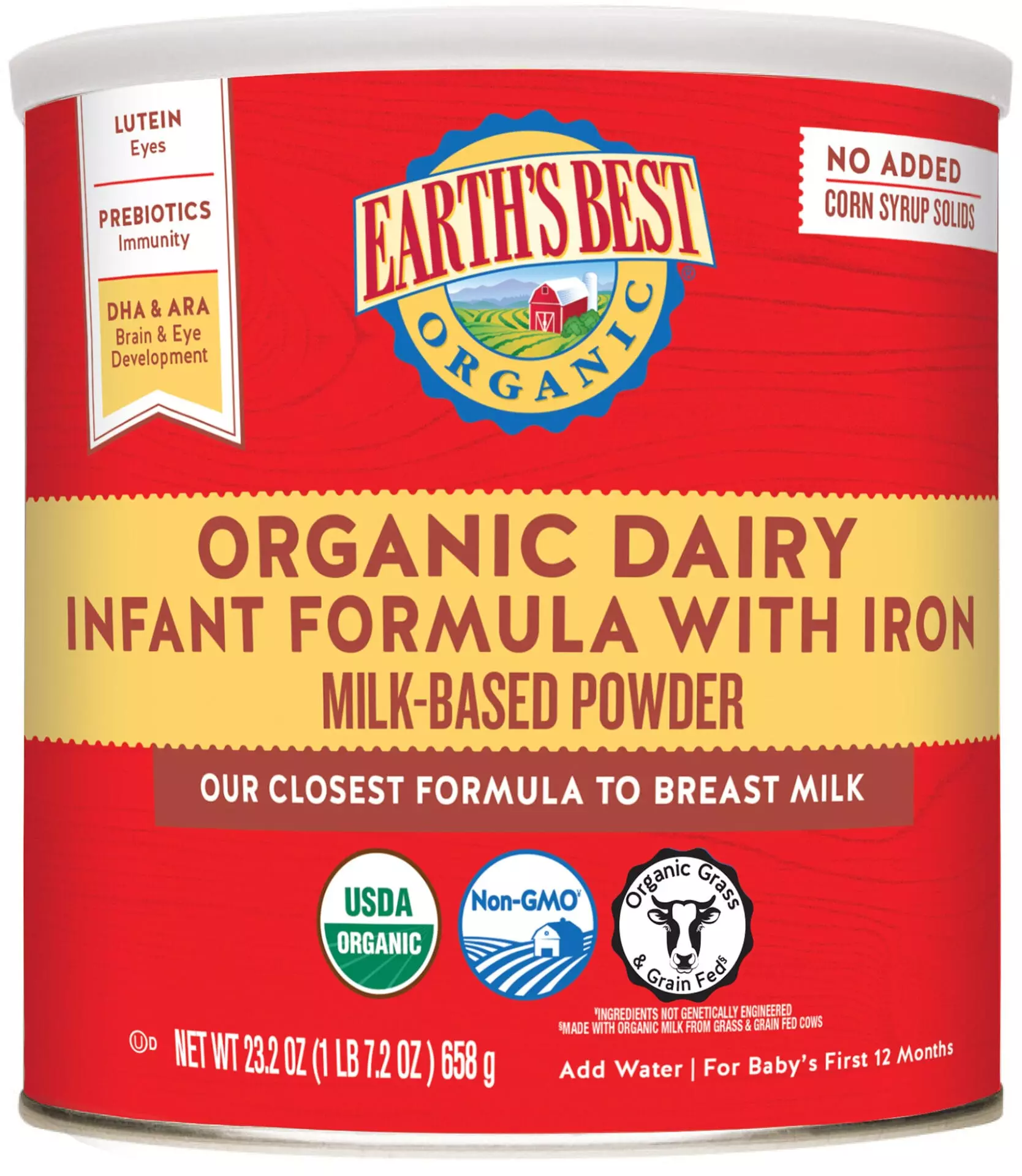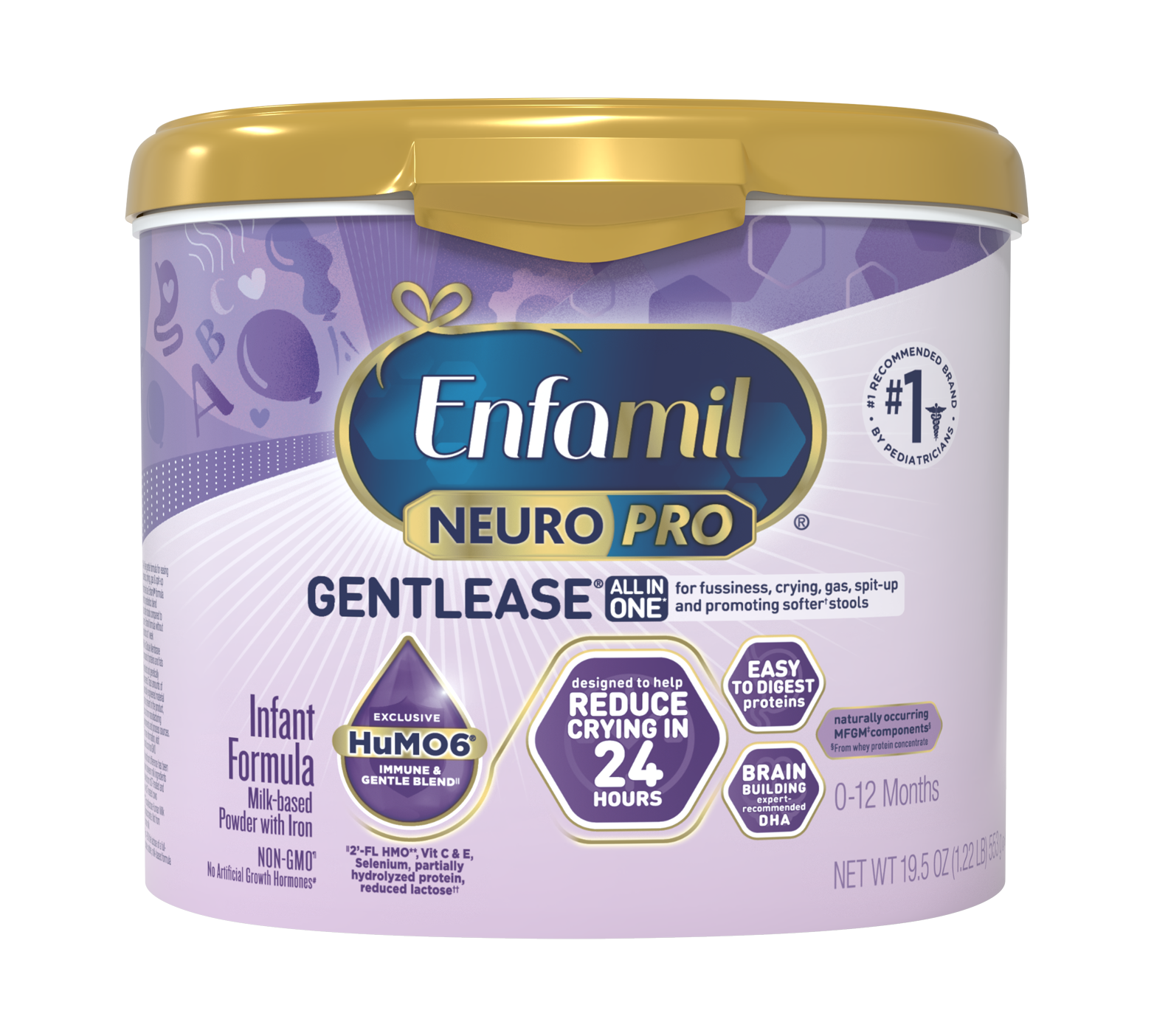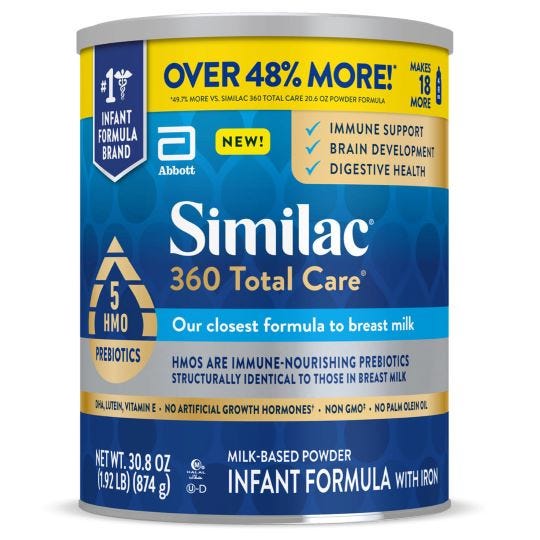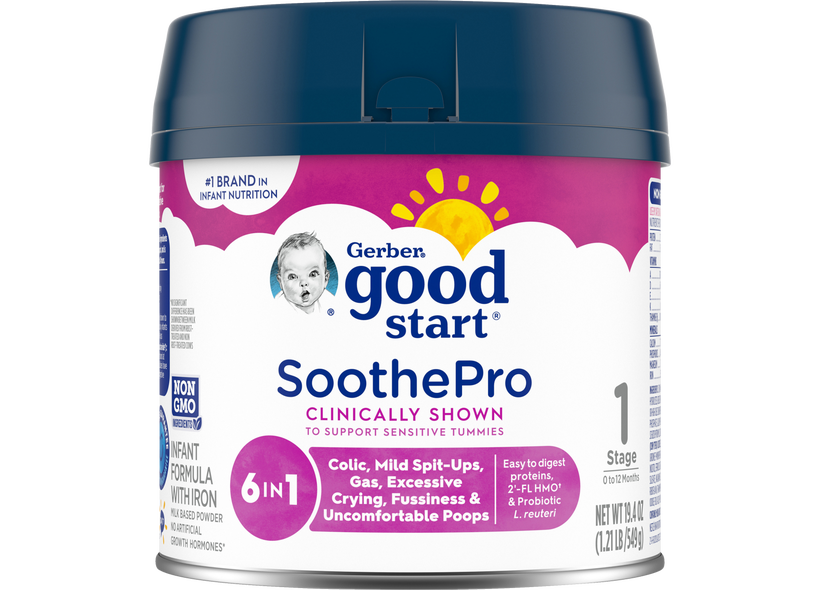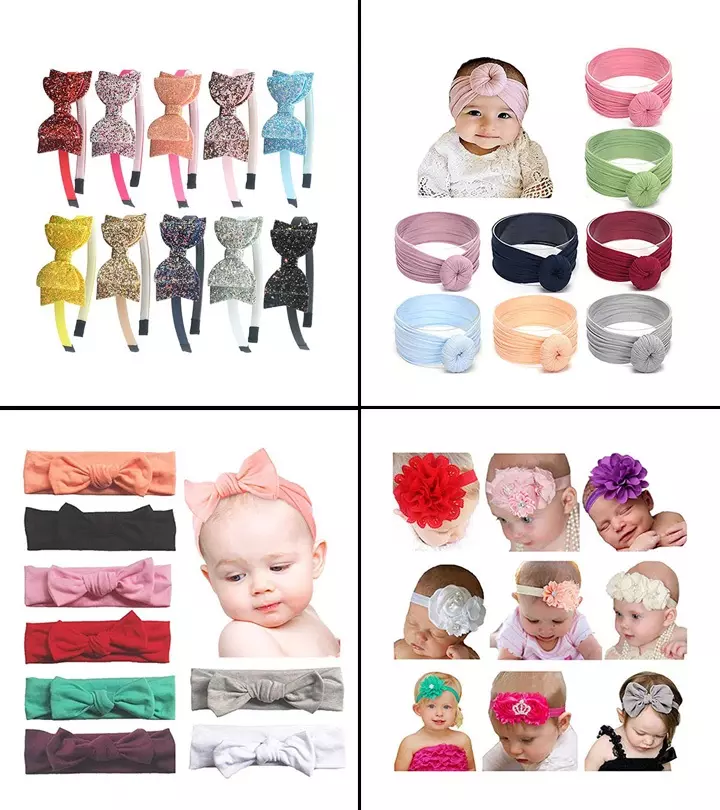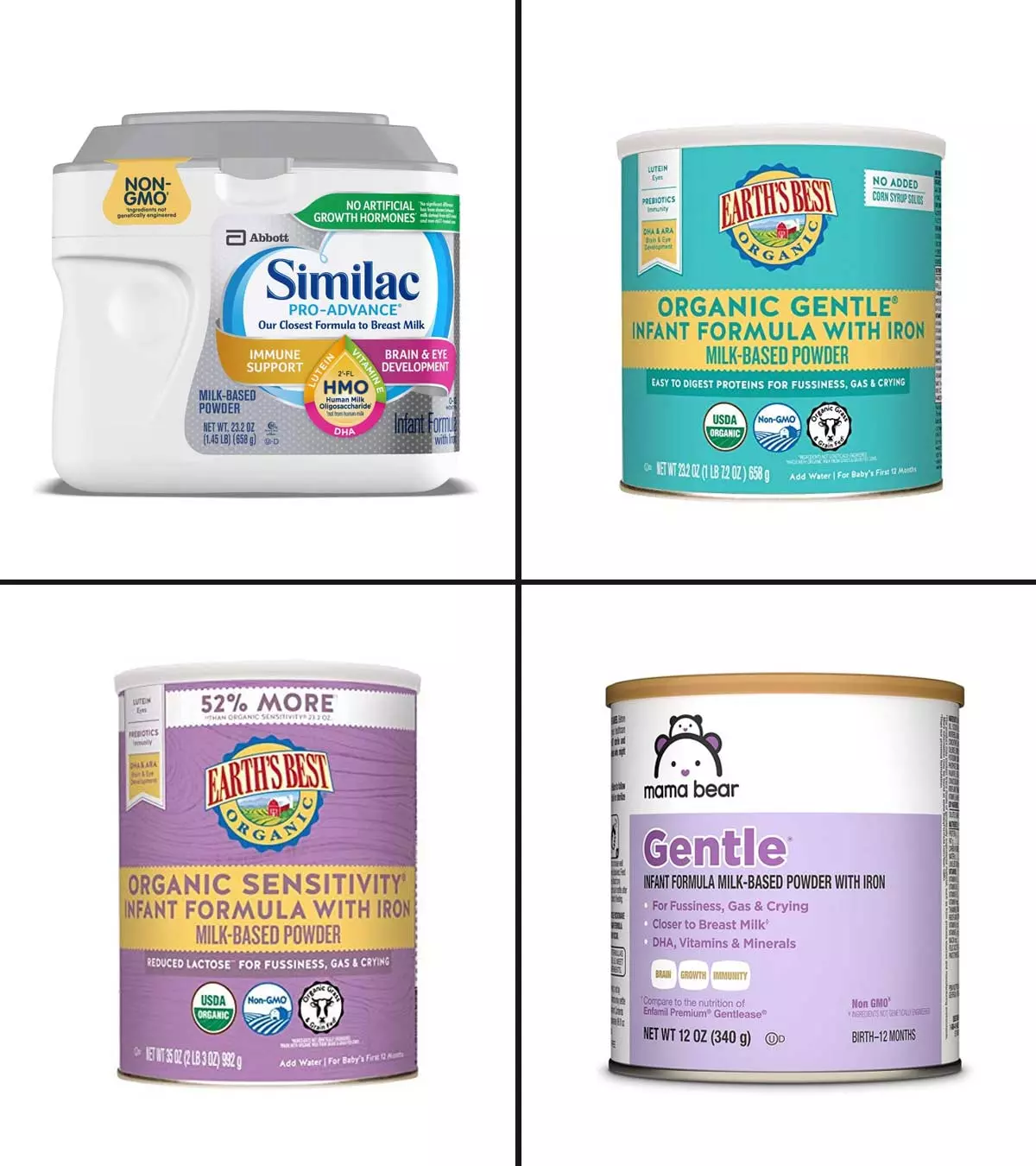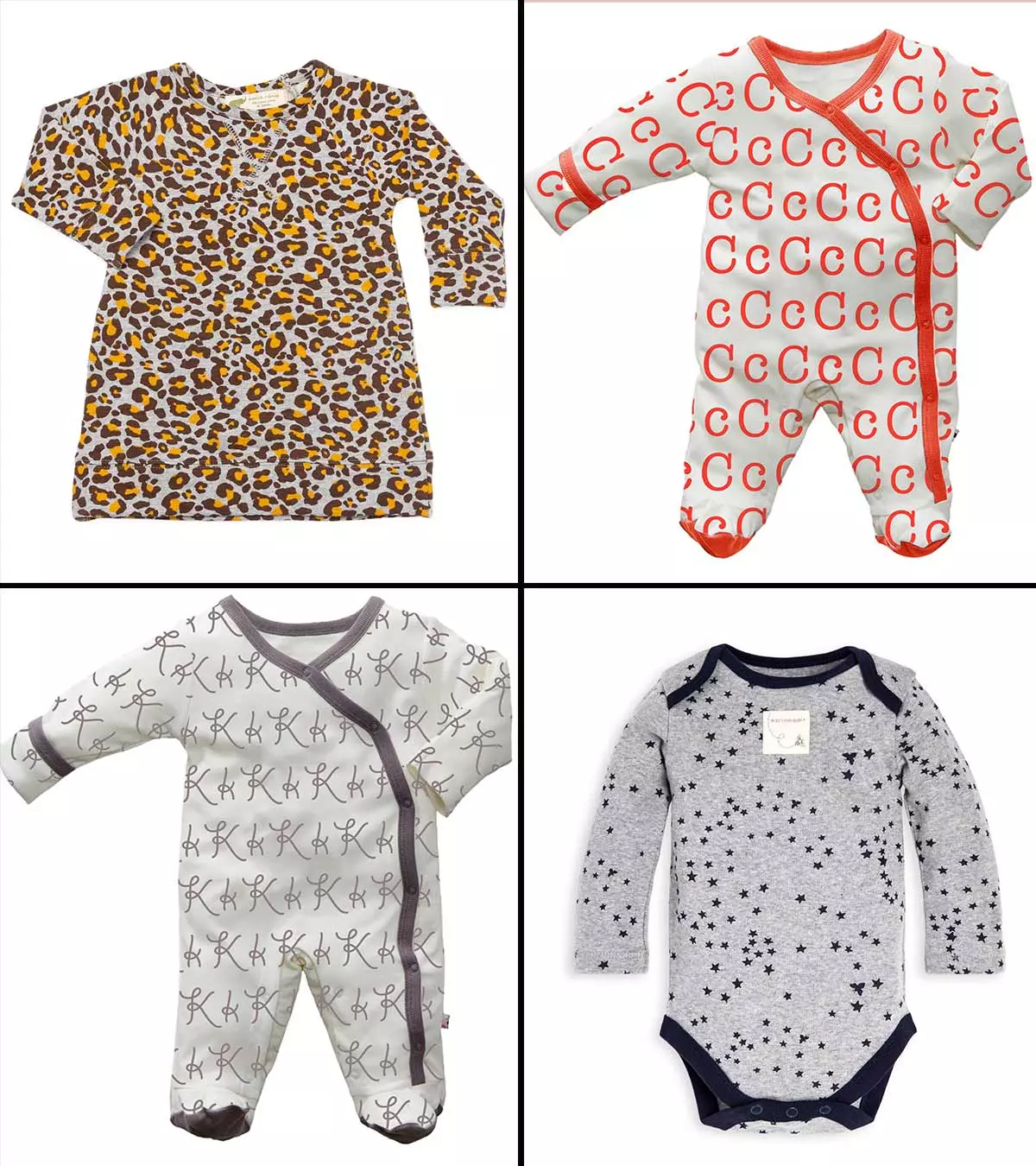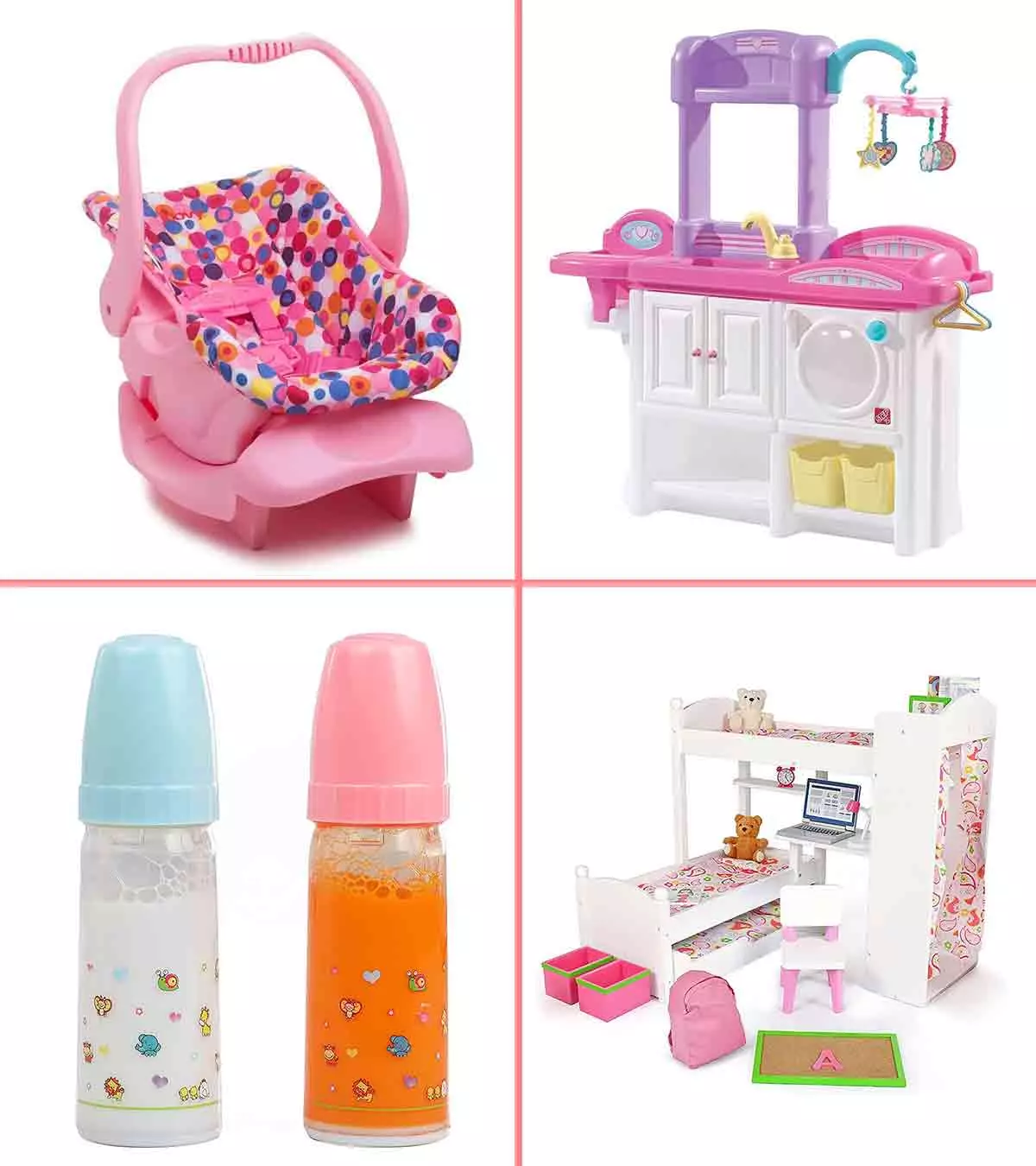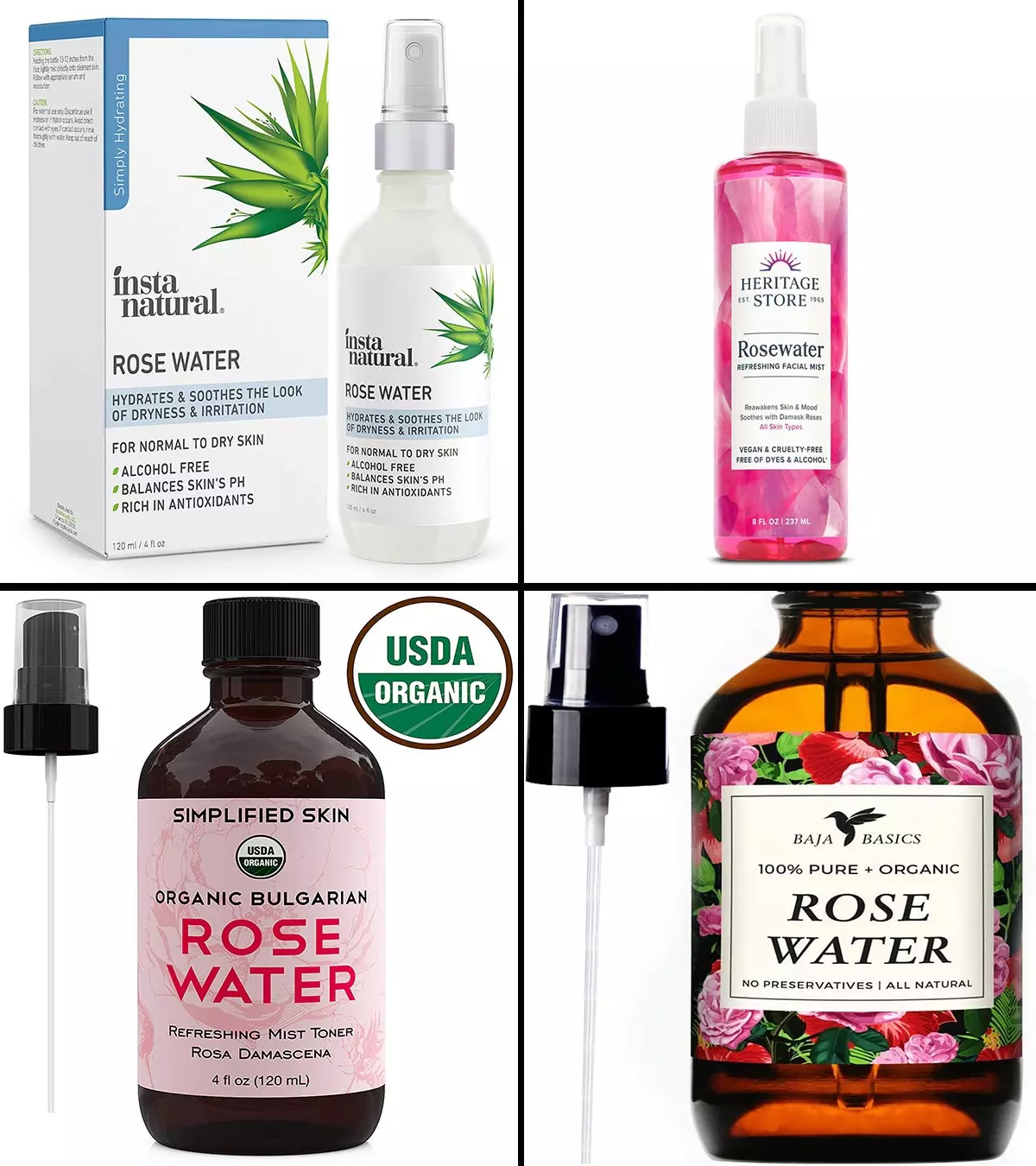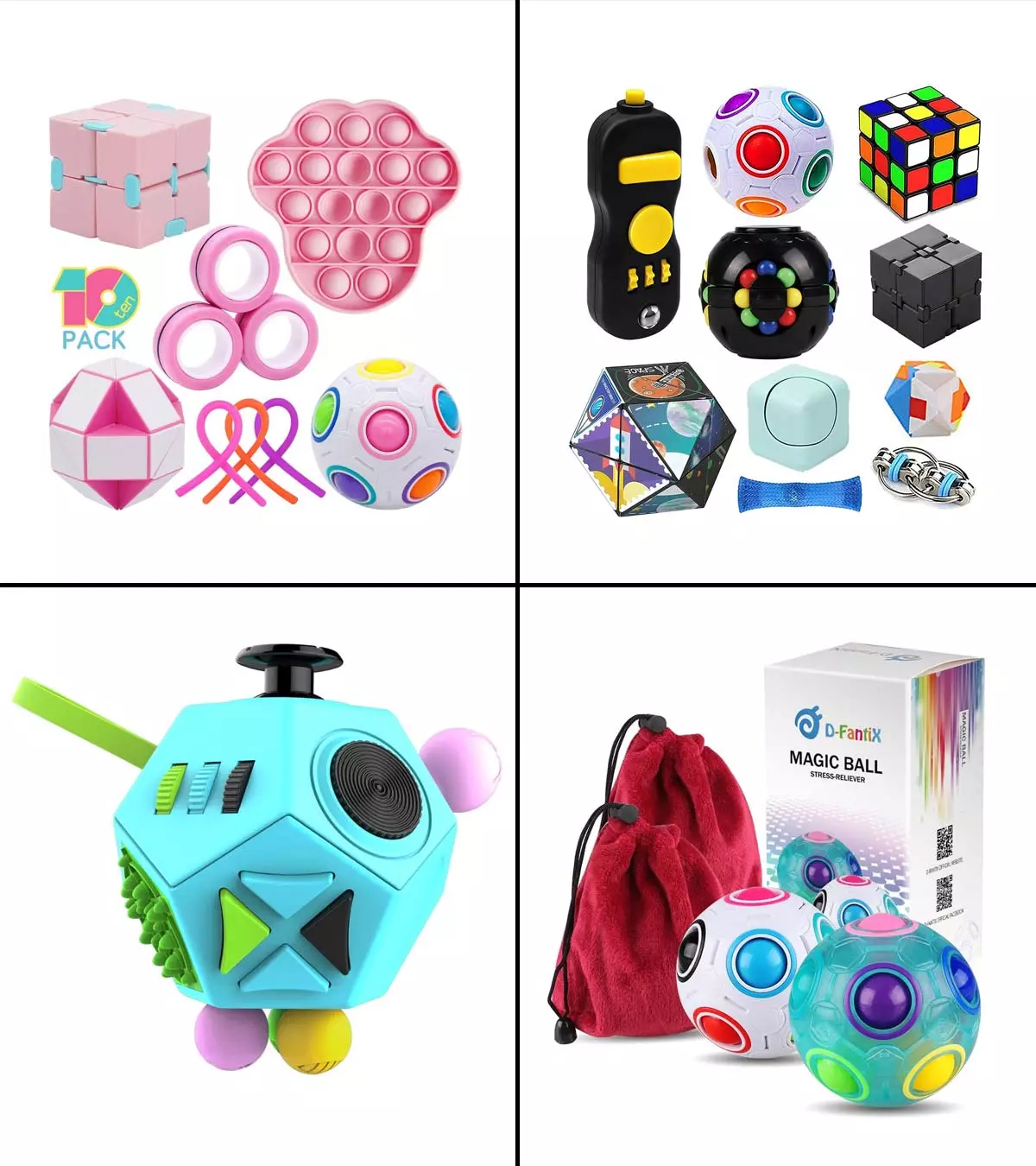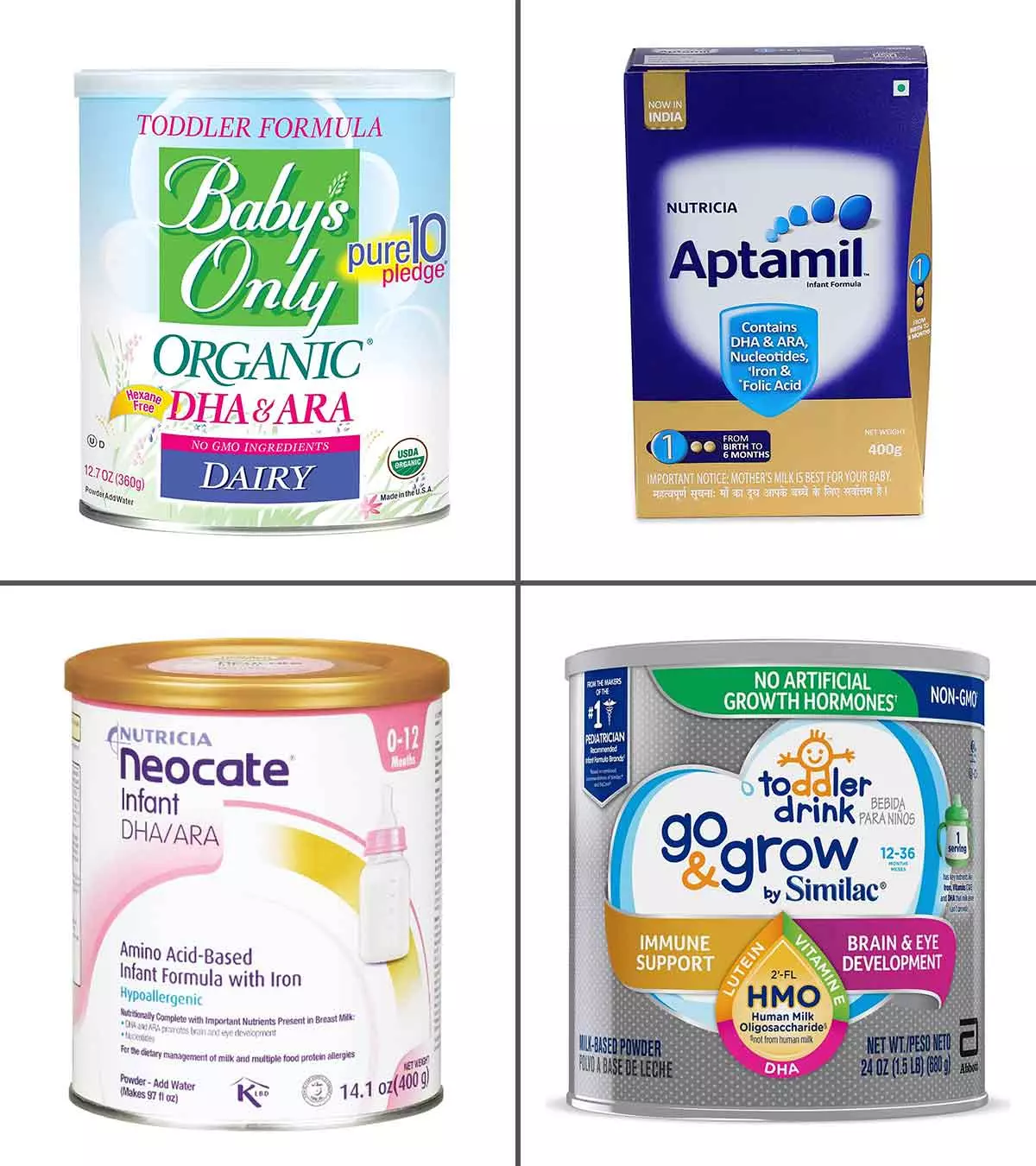
Image: MomJunction Design Team
If you are looking for a suitable alternative to breast milk, here’s our list of the best baby formulas to help you out. The World Health Organization (WHO) recommends mothers to breastfeed babies for the first six months of their lives (1). However, when breastfeeding may not be possible due to medical or non-medical reasons, parents should look for the best baby formulas to help their child meet the daily nutrient intake. Baby formulas are formulated as substitutes for breast milk and contain essential nutrients in appropriate amounts.
However, choosing the right powdered formula can be challenging for new parents, given the availability of numerous types and brands. So, our list includes top-notch formulas for babies with detailed information and pros and cons of each product to help you pick a suitable one for your little one. However, consult your child’s pediatrician before choosing any product. We recommend you pick a doctor-approved baby formula.
Top Picks
Safety Tips To Follow While Giving Formula To Your Baby
Note that baby formula is only an alternative food source for infants whose mothers cannot breastfeed and not a substitute for breast milk. Here are some precautions to keep in mind while using baby formula.
- Always consult your pediatrician or healthcare provider before starting a new baby formula or switching to another.
- Learn the pace feeding technique so that you do not overfeed the baby.
- Carefully read the ingredient list and avoid it if it contains ingredients that might cause allergy to your baby
- Do an allergy test by giving small amounts of the formula before feeding it through a bottle.
- If your baby shows signs of allergy, such as rashes, diarrhea, or constipation, discontinue the formula and try a new one after giving a gap of three to four days.
- Check the expiry date on the packet.
- Strictly follow the mixing table guidelines and always mix it right.
- Give only freshly mixed formulas.
- If you want it a few hours later, refrigerate the already prepared formula bottles in an insulated container.
- Always wash the bottles and nipples in hot water.
- If your baby has milk allergy, choose other options recommended by your child’s pediatrician
It is also important to know about the different types and forms of baby formulas to choose the right one for your baby.
Types Of Baby Formulas
Based on the ingredients and method of preparation, baby formulas are of six types.
- Dairy-based: You should not give cow’s milk to babies less than 12 months old as they would not digest it. However, some traditional formulas contain cow’s milk protein that is modified to be digestible for babies. Milk, sugar, vegetable oils, and iron are also added to make it close to breastmilk.
- Non-dairy: This type of formula is usually made of soy milk and best for babies who are intolerant to cow’s milk. It is fortified with vitamins, minerals, and nutrients. Such formulas are only prescribed in a handful of cases, so always consult your pediatrician before going for one.
- Organic: Some formulas are made from ingredients produced without using pesticides or fertilizers, and do not contain antibiotics or artificial growth hormones. However, a few of these may contain sucrose, which might cause tooth decay. So, check the labels before purchasing.
- Lactose-free: For babies who could be lactose intolerant, lactose-free formulas are recommended. In these, sugar lactose is substituted with corn starch.
- Hydrolyzed: These are the formulas for infants who have metabolic disorders, allergies or trouble digesting non-hydrolyzed formula. The proteins in such formulas are broken down into smaller proteins to make them easy for the baby to digest. Always consult your baby care specialist before switching to a pre-digested formula.
- Special: Some formulas are designed for premature babies with allergies. These formulas are mostly non-dairy, lactose-free, and pre-digested. These are not recommended unless a doctor or health professional prescribes them.
Based on the form, baby formulas come in three forms:
- Powder concentrate: You need to mix the powder with water that has been boiled and cooled. Add water to the bottle first and then the formula. Gently mix together and feed your baby. The packs come with specific mixing instructions.
- Liquid formula: These formulas come in liquid form and some require additional water to be mixed in. These too come with specific mixing instructions.
- Ready-to-feed: A pre-mixed ready-to-use formula can be directly fed to the baby without any mixing or diluting.
How To Prepare Infant Formulas? Do You Need Bottled Water?
Each product has its own preparation process, so check the package for instructions. But these are the common steps for preparation:
- Wash your hands well with warm water and soap.
- Take a sterilized bottle. Remember to sterilize the bottle, nipple, caps and rings in boiling water after each usage.
- Add the required amount of the formula into the bottle. Seal the remaining product well and store it away from moisture and sunlight.
- You can use a ready-to-feed formula directly after pouring it into the bottle.
- For a liquid concentrate, dilute the formula with clean water as per the manufacturer’s instructions.
- If using a powder, scoop the right amount into the bottle and pour water. Add water in batches for even distribution of the formula.
- Attach the nipple, tighten it.
- If the formula is cold, you could try placing the bottle in warm water. Do not warm it in a microwave.
- Feed your child and discard the remaining formula in the bottle after each feed. Do not store this half-fed formula as it could have been contaminated.
- Store freshly prepared formula in the refrigerator in a fresh container and label them with dates. Discard the formula if it hasn’t been used for 48 hours.
To prepare baby formula, you must use clean water. You may use bottled water after boiling it. Pour the required amount of water in a pan, cover it with a lid and let it boil for two to three minutes. Check that the water is at room temperature before using it.
If using tap water, check for its fluoride content and avoid using it if the levels are high. Tap water should also be boiled before use.
15 Best Formula Milk For Babies In 2025
1. Best Fuss-Free: Similac Pro-Advance Infant Formula
Type: Dairy
Style: Powder concentrate
Similac is a baby formula that is said to be close to breast milk and could be a good supplement when the mother is unable to produce enough breast milk.
Benefits: According to the manufacturer, this mom-approved lactose-based baby formula contains 2’-FL HMO, an immunity-boosting probiotic found in breastmilk. It also contains healthy DHA levels, lutein, and vitamin E that support bone health and brain and eye development. The manufacturer further claims that many mothers reported reduced fussiness, gassiness, and spit-up after one day of using this best formula milk for babies.
Ingredients:This baby formula is milk-based and fortified with iron; it also contains safe and effective ingredients such as fructooligosaccharides, nucleotides, a blend of DHA, Lutein, Vitamin E, and a palm olein oil-free fat blend that is good for calcium absorption.
Pros
- Said to be designed closest to breast milk
- Non-GMO ingredients
- No artificial growth hormones
- Reduces fussiness and gas
Cons
- Might have a slight odor
"This easy-to-digest infant formula has become my baby's most preferred choice. It tastes okay and is comforting to his tummy. The only drawback is the occasional clumping during mixing, but it's a good product overall."
 Do remember
Do remember2. Best Non-GMO: Similac Pure Bliss Infant Formula
Type: Dairy
Style: Powder concentrate
If you’re looking for an infant formula that is as close to breast milk as possible, look no further than Pure Bliss by Similac. This soy-based formula is trusted by moms, as it is thoughtfully formulated to mimic the nutrients found in breast milk, so your little one can get all the goodness they need for proper growth and development.
Benefits: One of the key benefits of Pure Bliss is that it does not contain artificial growth-promoting hormones, antibiotics, or palm olein oil. In addition to being free from artificial ingredients, Pure Bliss is also non-GMO, so you can trust that your baby is getting the best possible nutrition.
Ingredients: Nonfat milk, high oleic sunflower oil, whey protein concentrate, coconut oil, lutein, soy oil, beta-carotene, M.Alpina oil, vitamins, and minerals.
Pros
- Provides immune support
- No added corn syrup solids
- Provides complete nutrition for infants
- Supports brain and eye development
Cons
- May cause constipation in some babies
"My fussy baby has taken well to this formula. And I have also noticed a reduction in issues such as spitting up and gas. I wish it came with a scoop or leveler, but it ticks the boxes for taste and digestibility. Hence, it gets the approval of this mother."
3. Best kosher-friendly: Earth’s Best Organic Dairy Infant Powder Formula
Type: Dairy/ Organic
Style: Powder concentrate
This is an organic baby formula made from cow’s milk. It is said to contain whey and casein protein in a ratio that brings it pretty close to breast milk. Certified USDA Organic, this cow’s milk-based formula could be one of the best infant formula milk for babies when the mother’s milk is insufficient. Here is a video that can give you more insights into the product.
Benefits: The manufacturer says this baby formula contains all the necessary nutrients required for the baby’s growth during the initial months. This best formula milk for babies contains Omega 3 DHA and Omega 6 ARA fatty acids that occur naturally in breast milk and support brain and eye development. It is also said to enhance immunity due to its fructooligosaccharides content.
Ingredients: Organic reduced mineral whey, organic nonfat milk, organic lactose, glucose syrup solids, organic palm oil, organic coconut oil, organic soy oil, etc.
Pros
- Easy to digest
- Organic
- Non-GMO ingredients
- No synthetic growth hormones, pesticides, or fertilizers.
- Kosher-friendly
Cons
- Some babies may experience constipation
- Can have a peculiar smell
"My little one readily accepted this formula for its taste and natural smell. It has helped her transition from breast milk to formula milk without much fuss, and I love that It's high in fructose corn syrup."
 Do remember
Do rememberSimilac Pure Bliss Infant Formula | Earth’s Best Organic Dairy Infant Powder Formula | Earth’s Best Organic Dairy Infant Powder Formula | |
|---|---|---|---|
| Dimensions | 5.13 x 5.13 x 5.35 inches | 5.1 x 5.1 x 4.88 inches | |
| Weight | 1.54 Pounds | 1.31 Pounds | |
| Rating | |||
| Reviews | 119 | 801 | 801 |
| Price | $29.99 | $31.43 | $31.43 |
4. Best Gentle-Formula: Enfamil Neuro Pro Gentlease Baby Formula
Type: Dairy/ hydrolyzed
Style: Powder concentrate
This is another variant of Enfamil designed to ease gas, fussiness, and crying in babies. It is pediatrician-recommended and formulated for infants up to 12 months.
Benefits: Similar to other Enfamil baby formulas, the Gentlease variant contains MFGM and DHA that support brain development. It also contains a probiotic blend that helps in the growth of your baby’s immune system. Additionally, the manufacturer claims that Gentlease formula milk for newborns might help ease feeding issues like fussiness and gas in just 24 hours.
Ingredients: Corn Syrup solids, vegetable oils, partially hydrolyzed nonfat milk, whey protein concentrate, whey protein-lipid concentrate, other essential vitamins, and minerals.
Pros
- Comes in different packages for ease of use
- Easily digestible ingredients
- Gentle on your baby’s stomach
Cons
- Formula might be bubbly
- May have a peculiar odor
"It has been a relief to finally find an infant formula that is easy to digest and gentle on my baby's stomach. It is filled with all the required nutrients and has made transitioning from breastmilk a breeze."
5. Best Organic : Happy Baby Organic Infant Formula
Type: Dairy/Organic
Style: Powder concentrate
This baby formula is said to be made of organic ingredients and formulated for babies of six months and above. Certified organic by the USDA, the Happy Baby Organic Infant Formula could be ideal for babies whose mothers cannot breastfeed them.
Benefits: It is made from organic ingredients and contains lactose, which is similar to that found in breast milk. It also includes key vitamins and minerals that are found naturally in breast milk. This trusted formula comes with a blend of four or more prebiotics, to promote a healthy gut.
Ingredients: Organic lactose, organic nonfat milk, organic palm olein, organic soy oil, organic coconut oil, organic whey protein concentrate, and other essential vitamins and minerals.
Pros
- Made of organically sourced ingredients
- Gentle on your baby’s stomach
- Formulated to be like breast milk
- Non-GMO and gluten-free ingredients
- No corn syrup solids
Cons
- Formula might be too bubbly
- May have a peculiar odor
"After experimenting with multiple brands and formulas, I have finally settled on this one due to the organic ingredients. Preparing it without making it foamy required some practice, but it has made my baby’s transition from breast milk to formula seamless."
6. Best Hypoallergenic: Enfamil Nutramigen Hypoallergenic Colic Baby Formula
Type: Non-dairy/ Hydrolyzed
Style: Powder concentrate
The pediatrician-recommended Enfamil baby formula can be helpful in managing colic babies. It is clinically proven to relieve allergy symptoms caused by cow’s milk, ensuring your baby is happy and well-rested.
Benefits: According to the manufacturer, the Enfamil baby formula contains a probiotic named LGG, which is known for managing milk protein allergy and supporting digestive health. This formula is also known to provide immune support without any allergic response when the baby goes back to consuming cow’s milk. It is lactose-free and contains important nutrients like omega 3 DHA, ARA, and Choline that support brain development.
Ingredients: Corn syrup solids, vegetable oil, casein hydrolysate, modified corn starch, mortierella Alpina oil, Crypthecodinium cohnii oil, and other vitamins and minerals.
Pros
- Hypoallergenic baby formula
- Lactose and sucrose-free
- Fast relief from colic due to cow’s milk
- No artificial growth hormones
Cons
- Formula might have a peculiar odor
- A little expensive than the rest
7. Best Dairy-Free: Neocate Infant Baby Formula
Type: Non-dairy
Style: Powder concentrate
This formula is for babies who are hypoallergenic to cow’s milk and have other food allergies as well. It is a non-dairy formula made in a dairy-free facility.
Benefits: This baby formula could be the best baby milk formula if you are unable to breastfeed and if your baby is hypoallergenic to cow’s milk. According to the manufacturer, the Neocate baby formula is clinically tested and is less allergenic than other formulas. It also contains all the essentials for your baby’s growth and development.
Ingredients: Corn syrup solids, refined vegetable oil, high oleic sunflower oil, sunflower oil, canola oil, and other essential vitamins and minerals.
Pros
- Hypoallergenic
- Dairy-free
- Soy oil-free
- No artificial colors or flavors
Cons
- Formula may be too thick to pass through the bottle nipples
- May have a peculiar smell
"Neocate emerged as a viable choice for us to escape the soy and cow milk formula's concerns. Although my baby took a little time to get used to the taste, the overall formula has significantly improved my child’s allergies, gastrointestinal pains, and colic. Hence, it's an option I would recommend."
8. Best Lactose-Free: Alfamino Infant Formula
Type: Non-dairy
Style: Powder concentrate
This hypoallergenic infant formula could be one of the best formula milk options for babies who are allergic to cow’s proteins or have multiple allergies and malabsorptive conditions. It is designed for babies aged zero to 12 months of age.
Benefits: According to the manufacturer, this baby formula is dairy-free and is suitable for babies with allergies. It is also said to be nutrient-rich to support your baby’s growth. The formula’s unique fat blend contains medium-chain triglycerides to help fat absorption.
Ingredients: Corn syrup solids, medium-chain triglycerides, vegetable oils, potato starch, and other important nutrients and minerals.
Pros
- Lactose- and gluten-free
- Easy-to-digest
- Helpful for babies with allergies
Cons
- May not be suitable for some babies
"I am glad I got this formula for my baby. Despite a slightly strange taste, its effectiveness satisfied me, providing a much-needed solution for my baby's digestive issues. Also, the formula being hypoallergenic is a plus! I'd suggest giving it some time to let your baby slowly adjust to it."
9. Best FDA-Certified: Mama Bear Gentle Infant Formula Milk
Type: Dairy/ Hydrolyzed
Style: Powder concentrate
If you are unable to breastfeed your baby, this tried-and-tested infant formula might help you provide the required nutrients during the initial months. This baby formula is gentle on your baby’s developing digestive system and meets the nutritional standard guidelines and FDA quality standards.
Benefits: According to the manufacturer, this baby formula is said to be close to breast milk and is also easy-to-digest by newborns. It contains DHA, vitamins, and minerals that help in optimal brain development and also supports the immune system and growth.
Ingredients: Corn syrup, nonfat milk, palm olein, partially hydrolyzed whey, soy oil, coconut oil, high oleic oil, and other nutrients and minerals.
Pros
- Helps reduce colic, fussiness, and crying
- Non-GMO ingredients
- Meets quality standards set by the FDA
- Comes in an easy-to-store package
Cons
- May not suit all babies
"Switching to this formula was a breeze for my little one. It has also been gentle on his stomach and helped keep gas at bay. Plus, the scoop and its designated slot on the box are a nice touch."
10. Best Overall: Baby’s Only Organic Formula
Type: Dairy and non-dairy/ organic
Style: Concentrated powder
If you are looking for a baby-friendly formula that is organic and safe, check the Baby’s Only Organic Formula, which is safety-tested by CleanLabelProject. It is said to be made using organic ingredients and is free of hormones, harmful pesticides, or fertilizers. This video from a reviewer will help you understand how helpful this formula is for your baby.
Benefits: The manufacturer claims that this formula contains organic DHA and ARA derived from egg phospholipids that support the child’s brain and eye development.
Ingredients: Made from natural ingredients like soy, dairy, and coconut, this baby formula is said to be close to breast milk. It also comes in dairy, whey+dairy, and non-dairy variations (for lactose intolerant babies).
Pros
- Organic
- Gluten-free
- Non-GMO ingredients
- No harmful pesticides or hormones
- Does not contain corn/glucose syrup, palm oil, and Hexane-processed DHA
- BPA-free convenient packaging
- Non-hexane processed DHA for better absorption
Cons
- May not be suitable for some babies
- Becomes frothy upon shaking
"I mostly prefer this baby formula for its organic and non-GMO formulation. Dissolving it takes time, but it has my approval as my baby's comfort food."
 Caution
Caution11. Best Easy-To-Digest: Aptamil Baby Formula
Type: Dairy
Style: Powder concentrate
The expert-approved Aptamil Stage 1 Baby Formula is a nutritionally complete, iron-fortified infant formula for babies from birth to six months of age. It is designed to support the nutritional needs of newborns and infants during their first months of life, when they cannot breastfeed, or when breastfeeding is insufficient.
Benefits: It contains prebiotics to support the healthy gut microbiome development, which is essential for overall health, making it a baby-friendly product. It is free from genetically modified ingredients and contains no added sucrose or corn syrup.
Ingredients: Dairy-based blend, vegetable oils, skimmed milk, demineralized whey, whey concentrate( from milk), fish oil, milk protein, oil from mortierella alpina, galacto-oligosaccharides, vitamins, and minerals.
Pros
- Contains DHA and Omega 3 fatty acids for brain and eye development
- Strengthens the immune system
- Easily digestible
- Easy to prepare
Cons
- Some babies may have allergies or sensitivities to the ingredients in the formula
- Quantity may not be sufficient
"I was drawn toward the Aptamil formula due to its high-quality ingredients. It has helped with my little one’s colic and other stomach issues. Plus, the built-in scoop holder and its tendency to mix quickly and easily make it easy to prepare a bottle in the middle of the night."
12. Best For Balanced Diet: Nestlé Nan Supremepro Baby Formula
Type: Dairy/ Hydrolyzed
Style: Powder concentrate
Nestlé NAN SUPREMEpro 2 is a premium follow-on baby formula that supports your growing baby’s nutritional needs. It is formulated with high-quality ingredients, including lactose, vegetable oils, and essential vitamins and minerals, making it a trusted choice.
Benefits: This formula is enriched with probiotics to support your baby’s digestive system and is easy to digest. It is suitable for babies aged six to 12 months and can be used as a supplement to breastfeeding or as a sole source of nutrition.
Ingredients: Milk from lactose, enzymatically hydrolyzed whey protein, antioxidants, tuna fish oil, lacto-N-neotetraose
Pros
- Promotes brain and eye development
- Easily digestible
- Provides a balanced diet for babies who are no longer breastfeeding or have difficulty breastfeeding
- Easy to mix and prepare
Cons
- May not be suitable for lactose-intolerant babies
- Some children may not like the taste
"I found this formula easy to prepare. Also, its prebiotic content makes it easier for my babies to digest. It may lead to slightly smelly spells of poop at times; however, its ability to provide complete nutrition outweighs this minor drawback."
13. Best Nutrition-Based Formula: Nestle Nan ExpertPro SensiPro Starter Powder Baby Formula
Type: Dairy
Style: Powder concentrate
Nestle Nan ExpertPro SensiPro Starter Powder Baby Formula is ideal for meeting your little one’s nutritional needs. This formula provides antioxidants and is specifically designed for infants up to 12 months. It is made with high-quality ingredients to ensure optimal growth and development, making it a mom-approved product.
Benefits: The SensiPro formula contains a blend of proteins, carbohydrates, and essential vitamins and minerals to support the growth and development of your baby’s brain, bones, and immune system. It is also gentle on the baby’s digestive system and allows them to digest the necessary nutrients.
Ingredients: lactose, vegetable oils, enzymatically hydrolyzed whey protein, minerals, acidity regulator, vitamins, antioxidants, fish, and L-carnitine.
Pros
- Contains probiotics that support the growth of beneficial bacteria in the gut
- Hypoallergenic formula
- Contains iron and other vital nutrients
- Easy to mix and prepare
Cons
- May not be suitable for infants with severe allergies or sensitivities
- Some users have reported a strong smell or taste to the formula
"This formula has brought a lot of comfort to my gassy baby, and he also seems to like its taste. Its 1:1 ratio for scoop to ounce is slightly different from the brands I have tried, but the powder mixes well and is very gentle on my baby’s tummy."
14. Best For Immune System: Gerber Good Start Powder Infant Formula
Type: Dairy
Style: Powder concentrate
Formulated for infants aged zero to twelve months, this baby formula is designed to be close to breast milk composition. The manufacturer also claims that this formula might help in relieving fussiness and colic in babies.
Benefits: Available in powder concentrate, this baby formula might be able to provide the necessary nutrients to babies who are not able to breastfeed. The product contains prebiotics that help in growth of beneficial gut microbes. It contains specially designed proteins and probiotics that are easily digestible; it also contains DHA, 2’ FL- HMO, and other nutrients that support the immune system, eye, and brain development.
Ingredients: Corn Maltodextrin, whey protein concentrate, vegetable oils, and other nutrients and minerals.
Pros
- Non-GMO ingredients
- No artificial growth hormones
- No genetically engineered ingredients
- Specially designed lid to lock the freshness
Cons
- Some babies may experience constipation
15. Best For Colic Babies: Love & Care Gentle Infant Formula
Type: Dairy/Hydrolyzed
Style: Powder concentrate
Looking for formula milk that is gentle on your baby’s stomach? Then try the Love & Care formula that contains easily digestible proteins.
Benefits: The manufacturer says this baby formula contains all the nutrients needed to promote healthy growth in your baby during the first 12 months. It is designed to be close to breast milk and contains nutrients like DHA, omega-3 fatty acids, and plenty of vitamins and minerals. It also contains cow’s milk proteins broken into smaller parts to make them easily digestible for babies.
Ingredients: Corn syrup, nonfat milk, palm olein, partially hydrolyzed whey, soy oil, coconut oil, high oleic oil, Mortierella Alpina oil, crypthecodinium cohnii oil, and other necessary minerals and nutrients.
Pros
- Triple-care formula for brain development, immunity, and growth
- Supports healthy digestion to reduce colic and fussiness
- 25% less lactose than other formulas
- Non-GMO ingredients
Cons
- Might have a peculiar smell
"My baby has taken well to this gentle formula, and it has even reduced his spit-up issues. Although it requires a vigorous shake to get mixed, the consistency has been smooth. Hence, I recommend you go for it."
How To Choose The Right Baby Formula?
You need to pay utmost attention when choosing a baby formula. Here are a few things you need to look at while shopping for one.
- Consult your pediatrician: The first and foremost rule is to consult your pediatrician or healthcare provider, who will examine your condition and your baby’s health to prescribe the right formula.
- Check for allergens: If your baby is allergic to certain substances, check the labels, and avoid baby formulas that contain them. Also, check with your doctor for special formulas if your baby is premature, allergic, or has digestive problems.
- Nutrients and iron: Choose an age-appropriate powdered infant formula that contains the necessary nutrients and iron that help in the development of your baby during the initial days.
Frequently Asked Questions
1. Is it safe to mix breastmilk and formula in the same bottle?
Although you can mix breastmilk and formula, it is a waste of the former. Breast milk is customized nutrition for the baby. Also, both have different shelf-life, and by combining them, you may contaminate either of them.
2. How much formula should I feed my infant?
During the first month, a baby may consume up to two to four ounces with six to eight feedings a day. Their requirement may gradually increase by one or two ounces from the second month. After the sixth month, formula feeding is to be supplemented with solid foods (1).
3. Can formula cause constipation?
Baby formula may cause constipation in a few babies as it is harder to digest than breastmilk and as their system gets accustomed to the new diet. Constipation may also occur when too much formula is used (2).
4. Does formula increase baby weight?
Yes, formula milk can increase the baby’s weight. For the first six to eight weeks, there might be no difference in weight gain, whether they are formula-fed or breastfed. But after two months, you may notice a rapid growth in height and a healthy weight gain in formula-fed babies (3).
5. Does formula milk make babies sleep longer?
No, babies wake up multiple times at night. They may wake up when they are hungry, whether they are formula-fed or breastfed. But as they grow and are formula-fed, they may drink more milk and won’t need to wake up as often as they did when they were exclusively breastfed (4).
6. How will I know if formula is unsuitable for my baby?
Babies should be offered milk-based formula at the beginning. However, if you notice vomiting, diarrhea, belly pain, blood or mucus in the baby’s poop, sudden drooling, trouble swallowing, wheezing, and breathing problems, they may have formula intolerance (5).
Why Trust MomJunction?
Vibha Navarathna is a certified writer, with special prowess in informative content, she enjoys learning new things to curate well-researched articles for our readers. Her experience as a mother adds value to her articles on baby products and wellness. For new parents, Vibha has compiled this list of the best baby formulas from trusted brands and also included safety tips, buying guide, types of formulas, and a preparation guide to help you through the process. The products listed here have been added after careful consideration to ensure your child’s safety and good health.
Breast milk storage bags are a necessity for working mothers or any mom who might have to stay away from her baby for long. A good-quality milk storage bag is made of materials that are safe and packed in sterile conditions, so there is less likelihood of bacteria or other pathogens affecting the quality of milk. The options listed here have been chosen based on their durability, convenience of use, and volume, so you can store the milk knowing it is safe for your little one.
Infographic: Precautions To Take When Feeding Formula Milk To Infants
If you are unable to feed your baby your breast milk, infant formula can be a boon for the baby to get all the essential nutrients for their development. Since infant formula is only a substitute for human breast milk, certain precautions must be taken for their safe usage. Check out the below infographic for the safety tips you should follow when giving formula milk to the baby.

Illustration: Momjunction Design Team
References
- Feeding Guide For The First Year.
https://www.hopkinsmedicine.org/health/wellness-and-prevention/feeding-guide-for-the-first-year - Bottle Feeding Challenges
https://www.nhs.uk/start-for-life/baby/feeding-your-baby/bottle-feeding/bottle-feeding-challenges/colic-and-bottle-feeding/ - Growth of breast-fed and formula-fed infants
https://pubmed.ncbi.nlm.nih.gov/16902325/ - Feeding Your 1-to-3-Month-Old
https://kidshealth.org/en/parents/feed13m.html - Formula Feeding FAQs: Some Common Concerns
https://kidshealth.org/en/parents/formulafeed-concerns.html
Community Experiences
Join the conversation and become a part of our nurturing community! Share your stories, experiences, and insights to connect with fellow parents.
Read full bio of Mindy Cockeram
Read full bio of Vibha Navarathna
Read full bio of Wedetso Chirhah
Read full bio of Swati Patwal



